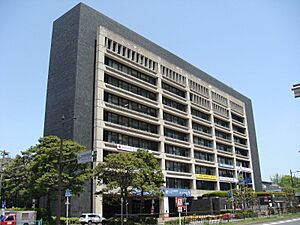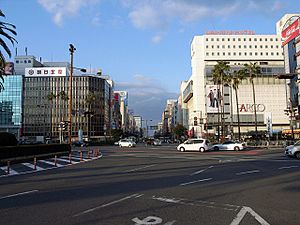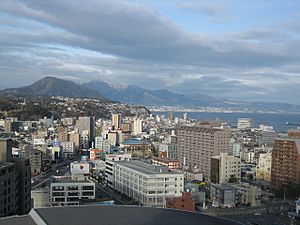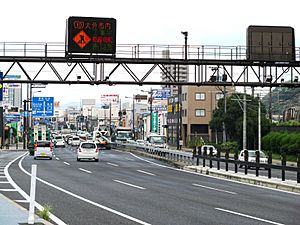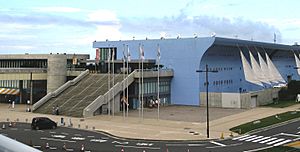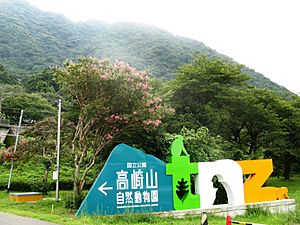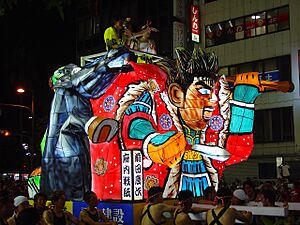Ōita (city) facts for kids
Quick facts for kids
Ōita
大分市
|
|||||||||||
|---|---|---|---|---|---|---|---|---|---|---|---|
![From top, left to right: Funai Castle, Monkeys in Mount Takasaki, Motomachi Stone Buddhas, Ōita Stadium, Old Ōita Bank [ja], Shopping street in central Ōita [ja]](/images/thumb/0/02/Oita_montage.jpg/300px-Oita_montage.jpg)
From top, left to right: Funai Castle, Monkeys in Mount Takasaki, Motomachi Stone Buddhas, Ōita Stadium, Old Ōita Bank, Shopping street in central Ōita
|
|||||||||||
|
|||||||||||
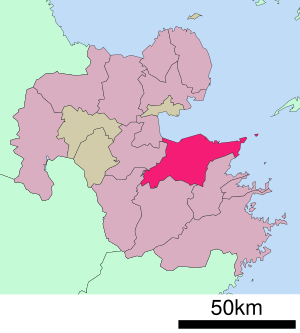 |
|||||||||||
| Country | Japan | ||||||||||
| Region | Kyushu | ||||||||||
| Prefecture | Ōita | ||||||||||
| Area | |||||||||||
| • Total | 502.38 km2 (193.97 sq mi) | ||||||||||
| Population
(November 30, 2023)
|
|||||||||||
| • Total | 474,804 | ||||||||||
| • Density | 945.109/km2 (2,447.822/sq mi) | ||||||||||
| Time zone | UTC+09:00 (JST) | ||||||||||
| City hall address | 2–31 Niage-machi, Ōita-shi, Ōita-ken 870-8504 | ||||||||||
|
|||||||||||
Ōita (大分市, Ōita-shi) is an exciting city in Japan. It is the capital city of Ōita Prefecture. You can find it on the island of Kyushu.
As of late 2023, about 474,804 people live in Ōita. The city covers an area of about 502 square kilometers. Ōita is known for its beautiful scenery and interesting history.
Contents
- Exploring Ōita's Location and Surroundings
- Ōita's Growing Population
- A Look Back at Ōita's Past
- Ōita's Economy and Industries
- Learning and Education in Ōita
- Getting Around Ōita: Transportation
- Ōita's International Connections
- Fun Places to Visit in Ōita
- Exciting Festivals and Events
- Famous People from Ōita
- See also
Exploring Ōita's Location and Surroundings
Ōita city is in the eastern part of Ōita Prefecture. It faces Beppu Bay, which is part of the Seto Inland Sea. Two important rivers flow through the city. The Ōno River flows from the south to the east. The Ōita River flows from the west. The main part of the city is on the west side of the Ōita River's mouth.
The Ōita Plain is made of land formed by these rivers. It has deltas and flat areas. Hills surround the plain. A part of the city, the Takashima area, is inside the Seto Inland Sea National Park. This park is famous for its natural beauty.
Cities and Towns Near Ōita
Ōita is surrounded by several other cities and towns. These include:
- Beppu to the northwest
- Bungo-Ōno to the south
- Taketa to the southwest
- Usuki to the southeast
- Yufu to the west
Ōita's Climate and Weather
Ōita has a humid subtropical climate. This means it has warm summers and cool winters. There is usually little to no snowfall. The average temperature in Ōita is about 15.6°C (60°F).
The city gets about 1663 mm (65 inches) of rain each year. September is usually the wettest month. August is the warmest month, with temperatures around 26.3°C (79°F). January is the coolest month, with temperatures around 5.1°C (41°F).
| Climate data for Oita City Nagahama District、elevation 5 meters | |||||||||||||
|---|---|---|---|---|---|---|---|---|---|---|---|---|---|
| Month | Jan | Feb | Mar | Apr | May | Jun | Jul | Aug | Sep | Oct | Nov | Dec | Year |
| Record high °C (°F) | 24.6 (76.3) |
25.5 (77.9) |
29.3 (84.7) |
31.2 (88.2) |
32.7 (90.9) |
35.4 (95.7) |
37.8 (100.0) |
37.6 (99.7) |
36.5 (97.7) |
33.1 (91.6) |
28.0 (82.4) |
25.0 (77.0) |
37.8 (100.0) |
| Mean daily maximum °C (°F) | 10.7 (51.3) |
11.5 (52.7) |
14.6 (58.3) |
19.7 (67.5) |
24.1 (75.4) |
26.5 (79.7) |
30.9 (87.6) |
32.2 (90.0) |
28.2 (82.8) |
23.3 (73.9) |
18.1 (64.6) |
13.0 (55.4) |
21.1 (70.0) |
| Daily mean °C (°F) | 6.5 (43.7) |
7.2 (45.0) |
10.2 (50.4) |
14.8 (58.6) |
19.3 (66.7) |
22.6 (72.7) |
26.8 (80.2) |
27.7 (81.9) |
24.2 (75.6) |
19.1 (66.4) |
13.8 (56.8) |
8.7 (47.7) |
16.8 (62.2) |
| Mean daily minimum °C (°F) | 2.6 (36.7) |
3.0 (37.4) |
5.9 (42.6) |
10.3 (50.5) |
15.0 (59.0) |
19.3 (66.7) |
23.5 (74.3) |
24.3 (75.7) |
20.9 (69.6) |
15.2 (59.4) |
9.5 (49.1) |
4.6 (40.3) |
12.8 (55.0) |
| Record low °C (°F) | −7.3 (18.9) |
−7.8 (18.0) |
−5.2 (22.6) |
−2.1 (28.2) |
1.7 (35.1) |
7.2 (45.0) |
14.0 (57.2) |
14.1 (57.4) |
8.8 (47.8) |
2.0 (35.6) |
−2.0 (28.4) |
−6.1 (21.0) |
−7.8 (18.0) |
| Average precipitation mm (inches) | 49.8 (1.96) |
64.1 (2.52) |
99.2 (3.91) |
119.7 (4.71) |
133.6 (5.26) |
313.6 (12.35) |
261.3 (10.29) |
165.7 (6.52) |
255.2 (10.05) |
144.8 (5.70) |
72.9 (2.87) |
47.1 (1.85) |
1,727 (67.99) |
| Average snowfall cm (inches) | 0 (0) |
0 (0) |
0 (0) |
0 (0) |
0 (0) |
0 (0) |
0 (0) |
0 (0) |
0 (0) |
0 (0) |
0 (0) |
0 (0) |
1 (0.4) |
| Average precipitation days (≥ 0.5 mm) | 5.9 | 7.7 | 10.0 | 10.0 | 9.7 | 14.0 | 12.0 | 10.6 | 11.1 | 7.7 | 6.9 | 5.5 | 111.0 |
| Average snowy days | 6.4 | 4.6 | 1.5 | 0.0 | 0.0 | 0.0 | 0.0 | 0.0 | 0.0 | 0.0 | 0.1 | 4.6 | 17.3 |
| Average relative humidity (%) | 62 | 63 | 65 | 65 | 68 | 77 | 77 | 75 | 74 | 70 | 69 | 64 | 69 |
| Mean monthly sunshine hours | 149.4 | 149.1 | 175.0 | 190.1 | 194.6 | 135.7 | 180.8 | 202.8 | 151.5 | 164.2 | 148.2 | 151.2 | 1,992.4 |
| Source: Japan Meteorological Agency (Averages:1991-2020, Peaks:1887-present) | |||||||||||||
Ōita's Growing Population
Ōita is the largest city in Ōita Prefecture by population. Over the years, the number of people living in Ōita has grown steadily.
| Historical population | ||
|---|---|---|
| Year | Pop. | ±% |
| 1960 | 242,001 | — |
| 1970 | 289,951 | +19.8% |
| 1980 | 385,635 | +33.0% |
| 1990 | 429,927 | +11.5% |
| 2000 | 454,424 | +5.7% |
| 2010 | 473,955 | +4.3% |
| 2020 | 477,393 | +0.7% |
A Look Back at Ōita's Past
The area where Ōita city stands today was once part of an ancient province called Bungo Province. It was an important center in old Japan. The main city was a port called Funai.
During the Kamakura period, a powerful family called the Ōtomo clan took control. They made Funai their castle town. By the Sengoku period, the Ōtomo family had become very strong. They even welcomed new ideas from the West, like the Christian religion and new technologies.
Later, the Ōtomo family lost their power. After the Tokugawa shogunate began, their lands were divided. Funai became the center of the Funai Domain.
The modern town of Ōita was officially created on May 1, 1889. It became a city in 1911. In 1997, Ōita was named a "core city." This gave it more power to manage its own local affairs. In 2005, two nearby towns, Notsuharu and Saganoseki, joined Ōita city.
Ōita's Economy and Industries
Ōita has a strong and diverse economy. It has grown a lot over the years.
Industrial Growth by the Bay
In the 1960s and 1970s, a large industrial area grew along the Beppu Gulf coast. Big companies like Nippon Steel and Showa Denko built important factories here.
Technology and Electronics
Later, in the 1970s, technology companies also came to Ōita. Toshiba and Canon built and expanded their factories inland. Ōita became a major center for making electronics. This included things like LSIs (tiny computer chips) and digital cameras.
Shopping and Downtown Areas
The main shopping areas and downtown are north of Oita Station. However, new, large shopping malls have been built outside the city center. This has caused some changes in where people go to shop.
Learning and Education in Ōita
Ōita is home to many schools and universities. Students can get a great education here.
Universities in Ōita
Ōita has several universities, including:
- Oita University (a national university)
- Oita Prefectural College of Arts and Culture (a prefectural university)
- Oita University of Nursing and Health Sciences (a prefectural university)
- Beppu University – Oita Campus (a private university)
- Nippon Bunri University (a private university)
- Oita Junior College (a private college)
- Ritsumeikan Asia Pacific University (a private university)
Schools for Younger Students
The city government runs many elementary and junior high schools. There are 54 public elementary schools and 25 public junior high schools. There are also two schools that combine elementary and junior high levels.
The Ōita Prefectural Board of Education operates 14 public high schools. There is also one combined middle/high school. Additionally, Ōita has six private high schools and three private combined middle/high schools. The city and prefecture also run special education schools for students with disabilities.
Getting Around Ōita: Transportation
Ōita has various ways to travel, making it easy to get around.
Air Travel: Ōita Airport
Oita Airport is located in the nearby town of Kunisaki. In the past, you could reach it quickly by hovercraft. This service stopped in 2009 but is planned to start again in late 2024. You can also get to the airport by bus, taxi, or private car.
Train Travel: Railways
Ōita is a hub for train travel. The luxury Aru Ressha train runs between Ōita and Hita. It helps boost tourism and the local economy.
![]() JR Kyushu operates several lines:
JR Kyushu operates several lines:
- Nippō Main Line: Nishi-Ōita - Ōita - Maki - Takajō - Tsurusaki - Ōzai - Sakanoichi - Kōzaki
- Hōhi Main Line: Takenaka - Naka-Handa - Ōita-Daigaku-mae - Shikido - Takio - Ōita
- Kyūdai Main Line: Bungo-Kokubu - Kaku - Minami-Ōita - Furugō - Ōita
Roads and Highways
Ōita is connected by several important roads.
 Higashikyushu Expressway
Higashikyushu Expressway National Route 10
National Route 10 National Route 57
National Route 57 National Route 197
National Route 197 National Route 210
National Route 210 National Route 217
National Route 217 National Route 442
National Route 442
Sea Travel: Port of Ōita
The Port of Oita is an important port. It helps with trade and transportation by sea.
Ōita's International Connections
Ōita has special relationships with cities around the world. These are called sister cities or friendship cities. They help promote cultural exchange and understanding.
 Austin, Texas, United States (since 1990)
Austin, Texas, United States (since 1990) Aveiro, Portugal (since 1978)
Aveiro, Portugal (since 1978) Guangzhou, China (since 1997)
Guangzhou, China (since 1997) Wuhan, China (since 1979)
Wuhan, China (since 1979)
Fun Places to Visit in Ōita
Ōita has many exciting attractions for visitors.
- Resonac Dome Oita: This stadium is also known as Big Eye. It is the home field for the J.League football (soccer) team Ōita Trinita. It also hosts large local events.
- Takasaki Mountain: This mountain is famous for its wild monkeys, especially the Japanese macaque. It borders the city of Beppu.
- Oita Marine Palace Aquarium: Right across from Takasaki Mountain, you'll find this amazing aquarium. It's also called "Umi-Tamago," which means "Sea Egg."
Exciting Festivals and Events
Ōita hosts fun festivals and sporting events throughout the year.
Ōita Tanabata Festival
The Ōita Tanabata Festival (大分七夕まつり, Ōita Tanabata Matsuri) happens every year. It takes place on the first weekend of August. On the first night, there's an event called Funai Pacchin (府内戦紙). During this event, special floats showing warriors are paraded through the city streets.
Sports Events in Ōita
Ōita is a city that loves sports!
- Beppu-Oita Mainichi Marathon: This famous marathon runs between Ōita and Beppu. It has been held every year since 1952. It is a very important road race.
- Kyūshū Ekiden: This is one of the world's longest relay races. It starts in Nagasaki and finishes in Fukuoka.
Ōita has also hosted many major sporting events:
- 1966 National Sports Festival of Japan
- 2001 Kirin Cup
- 2002 FIFA World Cup
- 2003, 2006, 2007 Kirin Challenge Cup
- 2005 J. League All-Star Soccer
- 2019 Rugby World Cup
Ōita's Sports Teams and Facilities
Ōita is home to several professional sports teams.
| Club | Sports | League | Venue | Established |
|---|---|---|---|---|
| Ōita Trinita | Football | J.League Division 1 |
Resonac Dome Oita | 1994 (as Ōita Trinity, changed to current name in 1999) |
| Vasagey Oita | Futsal | F.League | Oita Prefectural General Gymnasium | 2003 |
| Oita Miyoshi Weisse Adler | Volleyball | V.League | Toto Oita factory gymnasium | 1996 (as Miyoshi Department of Cardiology EKG, changed to current name in 2006) |
Famous People from Ōita
Many talented people come from Ōita. Here are a few:
- Mao Abe, a singer-songwriter
- Takamasa Anai, a judo wrestler
- Yuya Ando, a baseball player
- Misa Etō, a former member of Nogizaka46
- Eri Fukatsu, an actress
- Sōsuke Genda, a baseball player
- Arata Isozaki, a famous architect
- Yūko Kotegawa, an actress
- Atsuhiro Miura, a football player
- Daisuke Miyazaki, a handball player
- Tomiichi Murayama, who was the 81st Prime Minister of Japan
- Shigeichi Nagano, a photographer
- Chiyotaikai Ryūji, a sumo wrestler
- Yūsuke Santamaria, a TV personality
- Rino Sashihara, a member of HKT48 and former AKB48 member
- Seiichi Uchikawa, a baseball player
- Naomi Zaizen, an actress
See also
 In Spanish: Ōita para niños
In Spanish: Ōita para niños
 | Kyle Baker |
 | Joseph Yoakum |
 | Laura Wheeler Waring |
 | Henry Ossawa Tanner |





